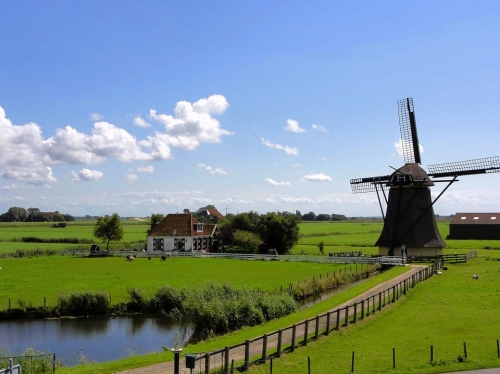One of the comforts for newcomers relocating to the Netherlands is Dutch people’s friendly enthusiasm for speaking English.
The Dutch love the English language and they revel in any opportunity to use it. They have even been rated the best speakers of English in the world.That’s extremely handy and reassuring in your first few months in the country, but what about after that? If you’ve been here a while now, you may want to understand a bit more of what is going on around you. At this point, you will need to take steps to learn Dutch and to coax locals into speaking it with you.
There are many reasons for learning Dutch, despite the Netherlands’ excellent grasp of English.
Immigration Requirements
For people from outside the EU, it may be a requirement of your residency permit. The IND website can give you more information about the conditions of your stay. Information about integration requirements, such as language learning, can be found here.
Asylum seekers are entitled to free language lessons and exams if they meet certain conditions. For most newcomers, language courses and exams have to be paid for or a loan taken out to cover the cost. You can find more information here.
Bilingual Children
If your partner is Dutch or your children attend a Dutch school or nursery, it can be hard being on the outside of conversations.
Playdates can be trickier if you cannot communicate with your Dutch-speaking guests. You may also want to get to know Dutch parents here and extend your social circle and support network. The paperwork that goes with arranging childcare, education, and health checks for your children is also easier once you know some Dutch.
Work
While many international companies conduct some of their business in English, once you speak Dutch, there are many more openings and networking is easier and more enjoyable.

Freelancers and business owners have much to gain by using Dutch rather than English if they intend to target the Dutch market. Research has shown that selling to people in their own language is far more effective.
Integration
A language reveals a great deal about a culture. The concept of gezelligheid (cosiness) and the penchant for adding the cute ‘je’ diminutive to nouns, such as vriendje (little friend/boyfriend), or biertje (little beer), speak volumes about the friendliness of the people here and the informality of the language.
If you want to break out of the expatriate circle and fully integrate into Dutch society, learning the language is an important step. Newcomers may enjoy a deeper relationship with native speakers once they demonstrate a commitment to learning the language.
Is Dutch Hard?
Every nationality appears to take pride in the alleged complexity of their language and the Dutch are no different. Stories abound about how poor pronunciation of Scheveningen, The Hague’s pleasure beach, was used to weed out spies in the Second World War. You will hear numerous times that ‘Dutch is a really hard language’, but this is not strictly true.
Research undertaken by the US Foreign Service Institute contradicts this, placing Dutch amongst the easiest languages for English speakers to learn.
Both Dutch and English are Germanic languages so many of the words are cognates: vocabulary that can be guessed as they are the same as, or similar to, words you already know. Examples of this are:
• Hand (hand)
• Haar (hair)
• Kop (cup)
Once you become familiar with patterns in pronunciation and spelling, you can quickly decipher new words.
Also pleasing is the ‘say what you see’ approach Dutch has to vocabulary. Why invent a bespoke word when you can express the idea with two familiar ones?
• Handschoenen (‘hand shoes’ – gloves)
• Natte sneeuw (‘wet snow’ – slush)
• Zwembril (‘swimming glasses’ – goggles)
Dutch is much more phonetic than English and more consistent in its pronunciation. You are unlikely to find anomalies like ‘weight’ and ‘height’, or ‘heading’ and ‘reading’.
Once you get the hang of the sentence structure, where verbs seem to move around a lot, Dutch grammar is simpler than many other European languages, such as French with its often silent agreements, or German with its numerous cases.
Perhaps the only reason Dutch appears to be hard is because few people try to learn it. This is surely due to its small population and number of speakers globally, and the fact that most Dutch people speak English.
Finding a School
One of the best – and most natural – ways to learn Dutch is by immersing yourself in Dutch life and exposing yourself to as much of the language as possible. If you want to accelerate the process, however, you might like to take lessons.

It can be hard to choose from the range of lessons on offer. Here are a few formats and locations to help narrow down your search.
Berlitz has language schools across the Netherlands and places an emphasis on communicating rather than on grammar.
Dutch For Expats has multiple locations and offers a huge range of learning formats including survival Dutch, business Dutch, Dutch for diplomats, and conversation coffee mornings. They also offer intensive summer courses at their base in The Hague.
For business Dutch, Elysio Talen offers learners structured, personalised plans in multiple locations as well as in-house training for companies.
If classrooms bore you to tears, Flowently, based in Amsterdam, is all about learning on the move and practising Dutch in authentic contexts.
Regina Coeli is best known for its language retreat in Vught (North Brabant) which used to be run by nuns. If you are looking to learn quickly through intensive study and immersion then this is a great option.
Rubio Dutch in the south of Amsterdam flips the conventional structure and does the theory at home and the homework in class. There is a free consultation to discuss your needs before you sign up and a choice of private tuition or group classes. The emphasis is on tailoring the lessons to your needs and there are even bring-your-baby courses for new parents.
Flexible Learning
If you would prefer to learn from the comfort of your own home, as and when you have time, an online course or audio lessons might be better for you. There are many to choose from. Here are four to get you started.
Babbel focuses on building on the words you know or can recognise. You can download the app to your phone and practise while on the move.
LearnDutch includes a free introductory programme. It has some nice little tests to gauge your level and, for a small price, you can download their flashcard app to help build up your vocabulary.
The Michel Thomas programme is one of the quickest ways to get proficiency in the language. There is no writing required and the learning takes place by comparing Dutch structures with English and creating new patterns to communicate new ideas. You learn alongside the two students in the recording and use the pause button to complete tasks orally before hearing their answers and the teacher’s input.
Rosetta Stone has an online course with cheerful graphics and speech recognition software.
Meeting Dutch Speakers
If it’s conversation that you are seeking and a chance to meet other language learners, consider going along to a meet-up or taal café (language café). Most are free and are a great way to socialise while improving your Dutch. If your local area is not listed below, Facebook is an easy way to search for a meet-up near you.
Amsterdam
Koentact run a fun language café in central Amsterdam and organise events for their members such as barbecues and karaoke.

The Zero Taal Café, run by Stichting Leren Helpt, meet every Wednesday at Lola Lik, in the south-east of the city. These informal sessions have a different theme each week and, when the sun is shining, take place outside. The organisation also has taal cafés in De Baarsjes and in Woerden.
Deventer
The public library in Deventer hosts a free language café and a women’s only group for a small fee.
Groningen
The NGO Humanitas organises taal cafés in the centre of the city and in the Paddepoel district where migrants of all backgrounds can meet to speak Dutch.
Utrecht
Language Café Utrecht is a student-run initiative to help people practise their foreign languages. The lively Wednesday nights are free of charge and take place in a local bar.
To find out more about language learning in the Netherlands and meet other learners, you can also attend the Drongo Talen Festival in September in Utrecht or take part in the Spreek Nederlands Dag in The Hague in July.
10 Tips for Beginners
1. Make learning Dutch part of your everyday life, not a time-consuming appendage to it.
2. Trust in your ability to learn. Acquiring language is a natural process – you do not need to force it. If you have enough exposure to Dutch, you cannot fail to improve.
3. Use Dutch in restricted contexts when the range of responses is more predictable. This could be ordering a beer or buying a ticket. Gradually build up the contexts as you progress.
4. Greet your neighbours in Dutch. This shows that you are interested in integrating and opens up more opportunities for interaction.
5. Find someone that you can practise your Dutch with. If they speak limited English, so much the better – you are both in the same boat!
6. Join your local library and build up your vocabulary by reading children’s books.
7. Tell as many Dutch-speaking people as possible that you are eager to improve your Dutch. They will encourage you and will try out short exchanges with you in the language.
8. Dedicate some environments as Dutch-speaking spaces. These might be your gym, your child’s school, or your office refectory – anywhere you go regularly where the prevailing language is Dutch.
9. You will be most successful if you make learning enjoyable. Watch your favourite TV show with Dutch subtitles, do a crossword in Dutch, listen to Dutch music. If you enjoy it, the words will stick better and you’ll keep up with your learning.
10. Focus on what you can do, not what you have yet to learn. Be conscious of the progress you are making and congratulate yourself on each milestone.
Have you learned Dutch? Share your experiences in the comments!

